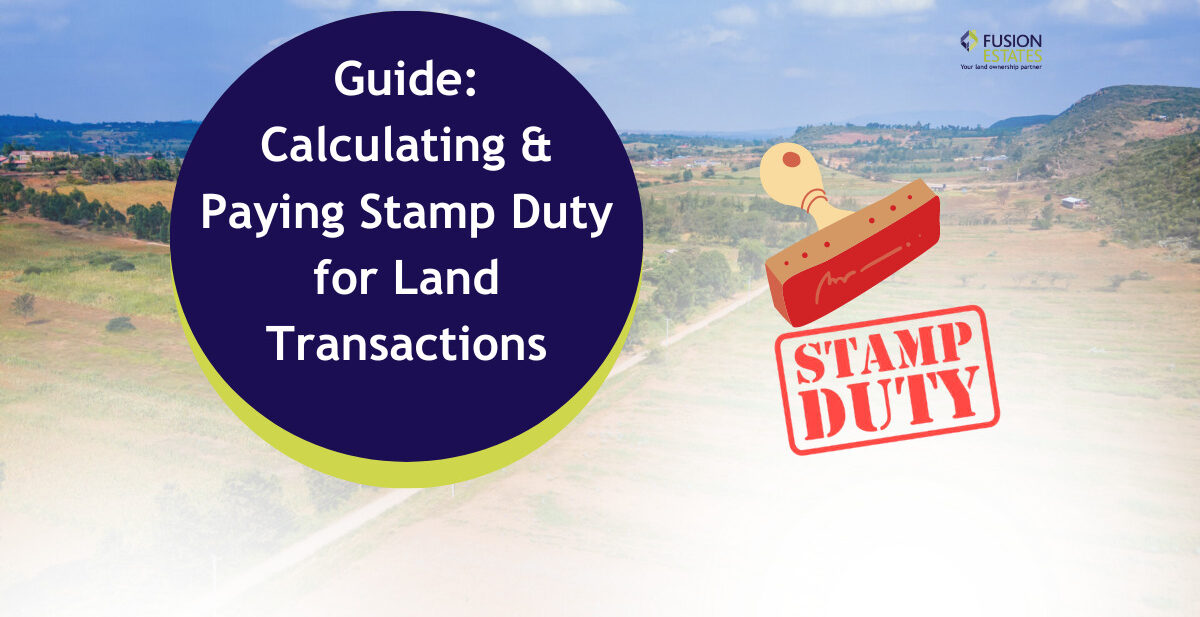One of the aspects you need to know as you buy land in Kenya is the closing costs, which will affect the overall cost of the transaction. Talking of the closing costs in land transactions, you’ll need to know how to calculate stamp duty in Kenya and pay for the fee. In fact, it can be one of the more intricate aspects of property transactions but we are here to help! This guide will break down everything you need to know about how to calculate stamp duty on land in Kenya and how to pay for stamp duty in Kenya.
What is Stamp Duty?
Stamp duty is essentially a tax you have to pay when you deal with legal documents, including as you buy or sell property. In this regard, this tax is levied by the Kenyan government on the transfer of ownership of land in a sale transaction.
Who Pays Stamp Duty in Kenya? Buyer or Seller?
You are probably wondering who pays stamp duty in Kenya buyer or seller? Well, the stamp duty fee is supposed to be paid by the land buyer.
In other words, as a buyer, you should factor this into your budget as you look to buy a plot in Kenya. Make sure you inculcate this in your sales agreement to avoid any legal issues as you buy land.
Is there Stamp duty in Kiambu?
When it comes to buying land in Kenya, you’ll have to deal with stamp duty no matter where you are, even in places like Kiambu County. Actually, the only difference is that the stamp duty rates vary depending on the location.
Currently, the stamp duty rates in Kenya for land outside urban areas, including municipalities and towns, is 2% of the property’s market value. However, a new 4% stamp duty rate now applies to land transfers in areas such as Kiambu
So, if you’re planning to buy a plot for sale in Kiambu such as Kikuyu, don’t forget to factor in the cost of stamp duty.
How to Calculate Stamp Duty in Kenya
Here’s a quick and simple guide to help you figure out how to calculate stamp duty in Kenya as you buy land:
- First things first, find out the property’s value: Let’s say you’re interested in a piece of land in Kikuyu, Kiambu, and it’s currently worth 2 million shillings.
- Next, know the rate that applies to you: Typically in Kiambu, you’ll pay a 4% stamp duty on the property’s value.
- Now, let’s do the math: Multiply the value of the property by the rate. For a 2 million shilling property, the calculation is as follows:
Stamp Duty = Property Value ✕ Stamp Duty Rate of the Area
So, for our example:
Stamp Duty = 2,000,000 ✕ 0.04 = 80,000
That means you’d pay 80,000 shillings in stamp duty for that KSh 2,000,000 plot.
It’s that simple!
Saving Tip: You can avoid incurring extra charges on stamp duty by buying land from Fusion Estates where you’ll get an all-inclusive purchase price that covers all the closing costs up to when you receive your title deed!
How to Pay Stamp Duty
Once you’ve calculated the stamp duty rates you’re required to pay the next step is to make the payment.
You can pay stamp duty using the Ardhisasa platform and it’s a piece of cake!
Here’s how to pay stamp duty:
- Log in to the Ardhisasa platform: Just go to the Ardhisasa platform and log into your account. If you don’t have one, go ahead and create it.
- Select ‘Ardhipay’ by clicking on the ‘Ardhipay’ option.
- Select the ‘Stamp Duty Self Assessment‘ option, then navigate to the ‘New Application’ button and select this option.
- You can then provide the relevant information about the land transaction & documentation needed and then click on ‘Submit’.
- Pay the stamp duty: An invoice will be generated and you can then click on the ‘Pay’ button. You can then choose a payment method & follow the instructions to complete the transaction.
Wrapping up
Knowing your estimated closing costs like stamp duty on land transactions is a must if you’re buying property in Kenya. Also, knowing what you need to pay will help you dodge any nasty surprises and keep the whole land transaction process running smoothly. Well, you can actually avoid incurring extra closing costs by simply working with reputable real estate companies in Kenya that offer an all-inclusive price covering all the closing costs including the stamp duty charges.


